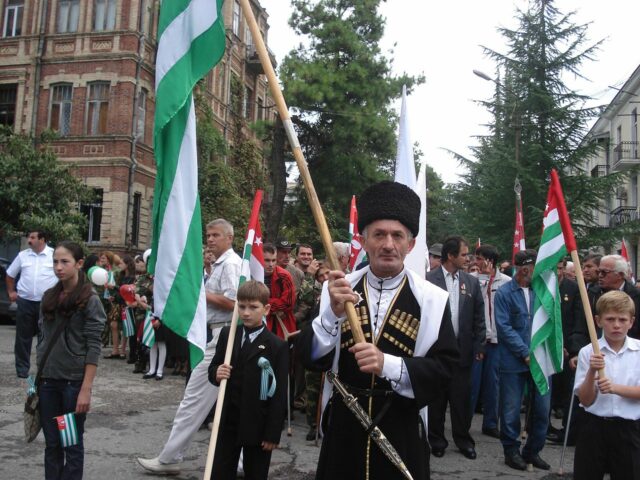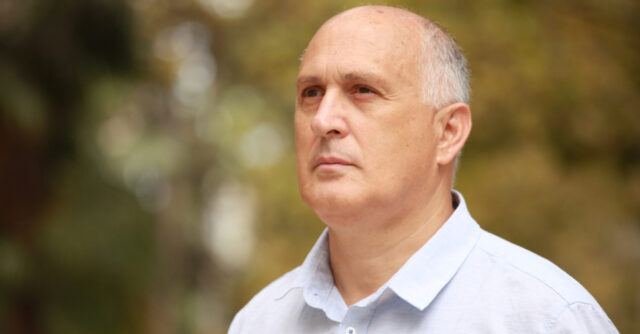Abkhazia Today: A Dialogue with Viacheslav Chirikba

Kavkaz Files ISSN 2975-0474 Volume Issue 19 Issue 1
Author: Silvia Boltuc
The South Caucasus region has garnered international attention in light of recent developments in Nagorno-Karabakh. This area has repeatedly demonstrated its strategic significance within the broader Eurasian geopolitical landscape, particularly in relation to unresolved conflicts.
One such matter of concern pertains to the enduring standoff between Georgia and Abkhazia. On September 30th, 2023, Abkhazia commemorated the 30th anniversary of its independence, a day which marks the end of the 1992-1993 war.
In August 2023, SpecialEurasia undertook a visit to Abkhazia, engaging in discussions with Viacheslav Chirikba, a distinguished Abkhaz scholar, linguist, and statesman, served as the Minister for Foreign Affairs of Abkhazia from 2011 to 2016, and presently Director at the Centre for Strategic Studies under the President of Abkhazia. This meeting sought to delve into both the regional geopolitical dynamics and the intricacies of the local socioeconomic landscape.
What is the current situation of your country considering the impact that the Ukraine conflict has in the post-Soviet space, especially in the Caucasus?
“The situation is more or less stable. As you can see, there are many tourists coming in Abkhazia and visiting our country for leisure and relax.
Of course, the international situation is tense and the conflict in Ukraine has influenced the entire world of international relations. By the way, it does not have a direct impact on Abkhazia.
There was a tense situation when the Ukrainian government invited the Georgian government to open a ‘second front’ against the Russian Federation by attacking Abkhazia. Although the situation was dangerous, we were confident because we have our army and the Russian military support considering that in accordance with the Abkhazian-Russian treaty on friendship, cooperation and mutual assistance of 2008, there are Russian military installations and bases in our country.
In this occasion, the Georgian leadership showed an unusual wisdom because Tbilisi decided to be not involved in the conflict and avoided to open a ‘second front’. Tbilisi’s interests were more important than Kyiv’s request, since Georgia and Russia have bound by socioeconomic links. Indeed, thousands of Russians migrated from their homeland to Georgia after the beginning of the Ukraine conflict, a presence which gave a significant stimulus to local economy.
After a period of tension, in Abkhazia people understood that the Georgian government did not want to start another war against our country.”
If we look at the economy, how geopolitical event such as the Ukraine conflict, Russia-the West confrontation, and the Covid-19 crisis, have affected Abkhazia?
“Talking about the Covid-19 crisis, I can say that I was pleasantly surprised if we look in the way the Abkhazian authorities managed the situation and faced the problem. We closed our borders with Russia first, but then, since many business owners were losing money, the government decided to reopen the borders. Consequently, the infection rate and then the mortality figures started rising. But miraculously, our medical facilities proved to be adequate to face Covid-19. Everyone had the attention and necessary cure.
Regarding the economy, I can say that we have some strategies and directions that are producing important results. I can mention, for instance, the services industry which registered a rise in the number of private businesses. Every year we have more hotels, cafes, restaurants and other enterprises and this shows the entrepreneurial mind that a part of our society has.
It is important to mention the tourist sectors since Abkhazia has a lot to offer to the tourists at a reasonable price. Many Russian and foreign tourists who are visiting Sochi decide to visit our country because we have different attractions from our historical monuments to our beautiful beaches, nature and sea.
Tourism became the locomotive of our economy and, if on the one hand this produces benefits, on the other hand, as we experienced because of the Covid-19, this sector might be hugely influenced by crisis and restrictions.
Since there is a demand for our food and beverage products, the entrepreneurial segment of the society can provide FOR these services. In this field, we have a flourishing production of wines and beer. Imagine that our export of wines to Russia has increased during the years and becomes a distinct product of Abkhazia. Of course, another typical production of our country are citrus fruits which is still an important product that we can export abroad.
We have a developed and extended state apparatus. Although I would like to see more people involved in small and medium enterprises (SME) and business, it also fair to stress government officials’ work in managing the country.
In services field we still have a lack of many facilities but I can say that we are going in to right direction, because a lot of young people are working or looking to set up a business in this sector. Talking about young generation, I should admit that young Abkhaz do not often consider to migrate abroad as compared to other countries in the South Caucasus, such as Armenia or Georgia, where many young people prefer to relocate. Therefore, we have an increasing number of young people who are involved in our society and, especially, in the business sector.”

Apart from international recognition, what are the urgent needs of the Republic of Abkhazia?
“Our urgent needs are connected with economy in general and with the energy sector. Indeed, we have a bad situation regarding our electric energy system which depends on Georgia. In this field, so far we have a good pragmatic collaboration with the Georgian side, but we don’t know whether this will continue in the future. That is why the electricity sector is a real problem that we should think about. We have small hydroelectric power stations in our country but they need renovation and modernisation. Indeed, in the last 30-40 years we did not have any renovation of this system, unfortunately.
Of course, our partnership with Russia influences in one or another way our domestic and foreign policy and economic strategy. The process of recognition is at a halt at the moment although we want to send a message to international partners that Abkhazia is not a pawn in Russia’s hands, as the Georgian propaganda and some western observers claim, we are an independent entity respected as such by Russia, which recognized our sovereignty and, as for example in the case of Kosovo, we will not reverse our policy of self-determination and of building up an independent state.
Since we live in the Internet era, I can say that it is now much easier to find information about Abkhazia as it was some twenty years ago. Therefore, more information about our country might support our position abroad and inform the international public opinion. Consequently, currently, there is a better understanding of our cause and position although there is still a lot of work to do to reach a broader international audience.”
Looking at the geopolitical scenario of the South Caucasus, in the last years the 2020 Nagorno-Karabakh conflict and the Ukraine conflict as well as Russia-the West competition have influenced the region. In this regard, what is Abkhazia’s role in regional geopolitics considering also the rising role of Turkey where there is a consistent Abkhaz diaspora?
“This is a good question since I give also lectures about geopolitics of Abkhazia at our university. What we would like to achieve in the regional setting is Abkhazia’s real subjecthood, despite the Georgian attempts to depict us as a land occupied by Russia. This is not the case, and the real situation is quite different. Abkhazia enjoys full internal sovereignty and, although limited for obvious reasons, a level of external sovereignty.
In geopolitics we can say that everybody uses everybody, and each state attempts to reach its goals with the help of other states. It’s only normal to be interdependent. We have very good relations with Russia, but there are also some lines that we should not cross according to our policy and views. This concerns our security and some important issues in internal politics.
We also had good relations with the Republic of Nagorno-Karabakh/Artsakh in the past, a region which experienced severe military escalations since the conflict in 2020, which resulted in Azerbaijan’s victory, since Baku is a strong income country thanks to oil and gas, IT has bigger population and it is also supported by Turkey. Of course, we are very concerned about the plight of the people of Artsakh.
But The situation regarding Abkhazia and Georgia is different. We have regular negations with Georgia within the Geneva discussions format, as our policy is aimed at normalising relations with Georgia. We have solid security relations with Russian Federation. Abkhazia is recognized by a number of un member states, first of all by Russia. That is why i don’t think that Georgia right now would decide to follow the Azeri example and attack Abkhazia, this is not an option. We had enough wars and miseries in the past, and our task now is finding a reasonable modus vivendi. Even a bad peace is better than a good war.
If we look at the capacities of lobbying, Abkhazia is increasing it in Turkey having there a large Abkhazian diaspora community. We are also running some programmes to educate the Abkhaz youth in turkey to speak our language. Ankara has never showed enmity towards our country and, if we consider the relations that we also have with Russia, Armenia, with Latin American states of Venezuela and Nicaragua, as well as with Syria and Nauru, we can say that we are not that isolated as the Georgians claim.
I think that at present moment Tbilisi government shows some signs of a pragmatic approach to Abkhazia, if we consider that Georgia refused to open the ‘second front’ that Ukraine requested from it. Also, the narrative has changed. Under Saakashvili the Georgian government had a MUCH more hostile approach towards Abkhazia than now the Georgian Dream party which leads the country.
Our difficult aim is to convince Tbilisi to recognise our country, because after that I believe that we can become good neighbours and friends again, as it was for centuries before, and both Georgia and Abkhazia would benefit from that friendship. indeed, we are open to improve pragmatic relations with the Georgians, which we already have in the energy sector, and we can speak also of operating the railway via Abkhazia to be used to open strategic “north-south” and “west-east” corridors.
I spoke informally with some Georgian politicians, and they were not against the normalisation of relations. the problem is that at the official political level, unfortunately, there is a virtual deadlock. This means that ahead of us there is still a lot of diplomatic work to do.”
Do you like SpecialEurasia reports and analyses? Has our groundbreaking research empowered you or your team? Now is your chance to be a part of our mission! Join us in advancing independent reporting and unlocking the secrets of Eurasia’s complex geopolitical landscape. Whether through a one-time contribution or a monthly/yearly donation, your support will fuel our relentless pursuit of knowledge and understanding. Together, let’s pave the way for a brighter future. DONATE NOW and secure your place in shaping the geopolitical narrative.
